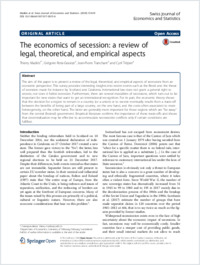The Economics of Secession : a Review of Legal, Theoretical, and Empirical Aspects
- Madiès, Thierry Department of Economics, University of Fribourg
- Rota-Grasiozi, Grégoire University of Clermont Auvergne, CNRS, CERDI, Clermont-Ferrand, France
- Tranchant, Jean-Pierre Institute of Development Studies, University of Sussex, Brighton, UK
- Trépier, Cyril CRAG, University of Paris 8 Saint-Denis, Paris, France
-
2018
Published in:
- Swiss Journal of Economics and Statistics. - SpringerOpen. - 2018, vol. 154, no. 1, p. 1-18
English
The aim of this paper is to present a review of the legal, theoretical, and empirical aspects of secessions from an economic perspective. This survey provides interesting insights into recent events such as the Brexit and the threat of secession made for instance by Scotland and Catalonia. International law does not grant a general right to secede, nor does it forbid secession. Furthermore, there are several modalities of secessions, which turn out to be important for new states that want to get an international recognition. For its part, the economic theory shows that the decision for a region to remain in a country (or a union) or to secede eventually results from a trade-off between the benefits of being part of a large country, on the one hand, and the costs often associated to more heterogeneity, on the other hand. The latter are generally more important for those regions which are “far away” from the central (federal) government. Empirical literature confirms the importance of these trade-offs and shows that decentralization may be effective to accommodate secessionist conflicts only if certain conditions are fulfilled.
- Faculty
- Faculté des sciences économiques et sociales et du management
- Department
- Département d'économie politique
- Language
-
- English
- Classification
- Economics
- License
- License undefined
- Identifiers
-
- RERO DOC 333218
- DOI 10.1186/s41937-017-0015-6
- Persistent URL
- https://folia.unifr.ch/unifr/documents/309497
Statistics
Document views: 100
File downloads:
- 2018_Madies_Economics.pdf: 170
